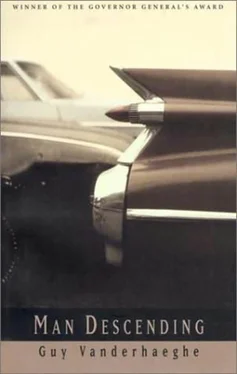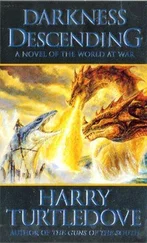Second, he confessed to knowing a tremendous amount about what made other people tick and how to adjust their mainsprings when they went kaflooey. He knew all this because at one time his own mainspring had gotten a little out of sorts. But now he was a fully integrated personality with a highly creative mind and a strong intuitive sense. That’s why he was so much help to Aunt Evelyn in her time of troubles.
Third, he was a Buddhist.
The only one of these things which impressed me at the time was the bit about being a Buddhist. However, I was confused, because in the Picture Book of the World’s Great Religions which we had at home, all the Buddhists were bald, and Thompson had a hell of a lot of hair, more than I had ever seen on a man. But even though he wasn’t bald, he had an idol. A little bronze statue with the whimsical smile and slightly crossed eyes which he identified as Padma-sambhava. He told me that it was a Tibetan antique he had bought in San Francisco as an object of veneration and an aid to his meditations. I asked him what a meditation was and he offered to teach me one. So I learned to recite with great seriousness and flexible intonation one of his Tibetan meditations, while my grandmother glared across her quintessentially Western parlour with unbelieving eyes.
I could soon deliver, “A king must go when his time has come. His wealth, his friends and his relatives cannot go with him. Wherever men go, wherever they stay, the effect of their past acts follows them like a shadow. Those who are in the grip of desire, the grip of existence, the grip of ignorance, move helplessly round through the spheres of life, as men or gods or as wretches in the lower regions.”
Not that an eleven-year-old could make much of any of that .
Which is not to say that even an eleven-year-old could be fooled by Robert Thompson. In his stubbornness, egoism and blindness he was transparently un-Buddhalike. To watch him and my grandmother snarl and snap their teeth over that poor, dry bone, Evelyn, was evidence enough of how firmly bound we all are to the wretched wheel of life and its stumbling desires.
No, even his most effective weapon, his cool benevolence, that patina of patience and forbearance which Thompson displayed to Grandmother, could crack.
One windy day when he had coaxed Aunt Evelyn out for a walk I followed them at a distance. They passed the windbreak of spruce, and at the sagging barbed-wire fence he gallantly manipulated the wires while my aunt floundered over them in an impractical dress and crinoline. It was the kind of dippy thing she would decide to wear on a hike.
Thompson strode along through the rippling grass like a wading heron, his baggy pant-legs flapping and billowing in the wind. My aunt moved along gingerly behind him, one hand modestly pinning down her wind-teased dress in the front, the other hand plastering the back of it to her behind.
It was only when they stopped and faced each other that I realized that all the time they had been traversing the field they had been arguing. A certain vaguely communicated agitation in the attitude of her figure, the way his arm stabbed at the featureless wash of sky, implied a dispute. She turned toward the house and he caught her by the arm and jerked it. In a fifties calendar fantasy her dress lifted in the wind, exposing her panties. I sank in the grass until their seed tassels trembled against my chin. I wasn’t going to miss watching this for the world.
She snapped and twisted on the end of his arm like a fish on a line. Her head was flung back in an exaggerated, antique display of despair; her head rolled grotesquely from side to side as if her neck were broken.
Suddenly Thompson began striking awkwardly at her exposed buttocks and thighs with the flat of his hand. The long, gangly arm slashed like a flail as she scampered around him, the radius of her escape limited by the distance of their linked arms.
From where I knelt in the grass I could hear nothing. I was too far off. As far as I was concerned there were no cries and no pleading. The whole scene, as I remember it, was shorn of any of the personal idiosyncrasies which manifest themselves in violence. It appeared a simple case of retribution.
That night, for the first time, my aunt came down to supper and claimed her place at the table with queenly graciousness. She wore shorts, too, for the first time, and gave a fine display of mottled, discoloured thighs which reminded me of bruised fruit. She made sure, almost as if by accident, that my grandmother had a good hard look at them.
Right out of the blue my grandmother said, “I don’t want you hanging around that man any more. You stay away from him.”
“Why?” I asked rather sulkily. He was the only company I had. Since my aunt’s arrival Grandmother had paid no attention to me whatsoever.
It was late afternoon and we were sitting on the porch watching Evelyn squeal as she swung in the tire swing Thompson had rigged up for me in the barn. He had thrown a length of stray rope over the runner for the sliding door and hung a tire from it. I hadn’t the heart to tell him I was too old for tire swings.
Aunt Evelyn seemed to be enjoying it though. She was screaming and girlishly kicking up her legs. Thompson couldn’t be seen. He was deep in the settled darkness of the barn, pushing her back and forth. She disappeared and reappeared according to the arc which she travelled through. Into the barn, out in the sun. Light, darkness. Light, darkness.
Grandma ignored my question. “Goddamn freak,” she said, scratching a match on the porch rail and lighting one of her rollies. “Wait and see, he’ll get his wagon fixed.”
“Aunt Evelyn likes him,” I noted pleasantly, just to stir things up a bit.
“Your Aunt Evelyn’s screws are loose,” she said sourly. “And he’s the son of a bitch who owns the screwdriver that loosened them.”
“He must be an awful smart fellow to be studying to be a professor at a university,” I commented. It was the last dig I could chance.
“One thing I know for sure,” snapped my grandmother. “He isn’t smart enough to lift the toilet seat when he pees. There’s evidence enough for that.”
After hearing that, I took to leaving a few conspicuous droplets of my own as a matter of course on each visit. Every little bit might help things along.
I stood in his doorway and watched Thompson meditate. And don’t think that, drenched in satori as he was, he didn’t know it. He put on quite a performance sitting on the floor in his underpants. When he came out of his trance he pretended to be surprised to see me. While he dressed we struck up a conversation.
“You know, Charlie,” he said while he put on his sandals (I’d never seen a grown man wear sandals in my entire life), “you remind me of my little Padma-sambhava,” he said, nodding to the idol squatting on his dresser. “For a while, you know, I thought it was the smile, but it isn’t. It’s the eyes.”
“Its eyes are crossed,” I said, none too flattered at the comparison.
“No they’re not,” he said good-naturedly. He tucked his shirt-tail into his pants. “The artist, the maker of that image, set them fairly close together to suggest – aesthetically speaking – the intensity of inner vision, its concentration.” He picked up the idol and, looking at it, said, “These are very watchful eyes, very knowing eyes. Your eyes are something like that. From your eyes I could tell you’re an intelligent boy.” He paused, set Padma-sambhava back on the dresser, and asked, “Are you?”
I shrugged.
“Don’t be afraid to say it if you are,” he said. “False modesty can be as corrupting as vanity. It took me twenty-five years to learn that.”
“I usually get all A’s on my report card,” I volunteered.
Читать дальше












